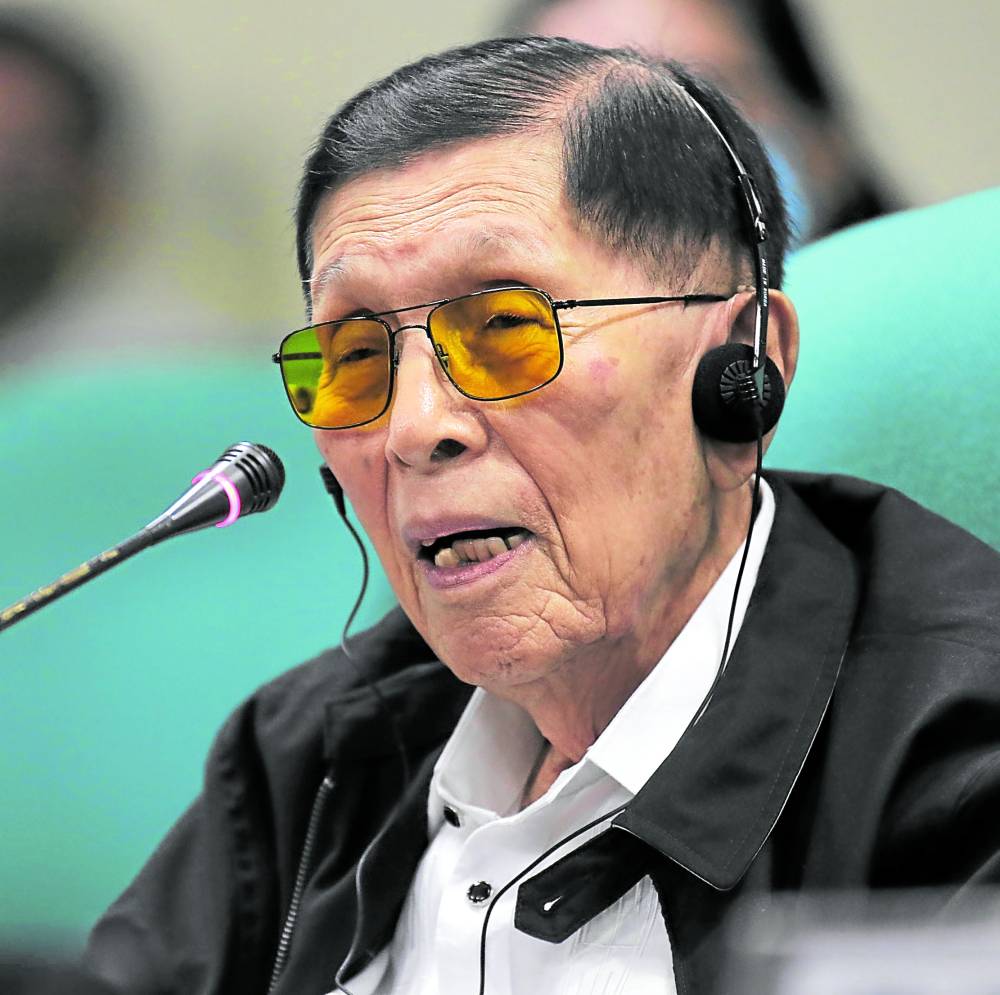SC coco levy ruling: a ‘personal insult’ to coconut farmers

Juan Ponce Enrile —Senate PRIB
A farmers’ group on Thursday criticized the Supreme Court’s decision to dismiss a graft case against former senator and now Chief Presidential Legal Counsel Juan Ponce Enrile and several others in connection with the alleged misuse of the coco levy fund, calling the ruling a “brazen” injustice.
Jansept Geronimo, spokesperson for the national farmer’s group Kilusan Para sa Tunay na Repormang Agraryo at Katarungang Panlipunan (Katarungan), said in an interview with the Inquirer that the ruling was also a “personal insult” to all coconut farmers.
He said that many of the coconut farmers, like his father, had passed away “without seeing the return of their hard-earned contributions” to the controversial multibillion-peso fund.
“It’s another injustice and a brazen one for the millions of coco levy contributors, most of whom are now sick and dying,” Geronimo said.
Geronimo’s father, Pedro, 73, died two years ago from a heart ailment and Parkinson’s disease.
He said that his father, “even on his deathbed … never lost hope that the faded coco levy certificates that the family still has would still be monetized.”
Geronimo, 40, a native of Candelaria town in Quezon province, said all his family members were coconut farmers, and almost all of them were coco levy fund contributors.
He got involved in the struggle for the return of the levy fund in his desire to bring justice to his family and the rest of the coconut farmers across the country.
Quezon farmers are believed to have been the biggest contributors to the coco levy fund collected mostly during the martial law regime of the late ousted dictator Ferdinand Marcos.
The coconut levy fund, now with the government, was estimated to be around P100 billion, at least P75 billion of which is in cash and the rest in assets, such as coconut mills.
Never went to trial
In a Jan. 16 decision rejecting a petition by the Office of the Solicitor General challenging the Ombudsman’s 1998 resolution to dismiss the graft case against Enrile and several other respondents in February 1990, the Supreme Court cited the government’s lack of justification for the “inordinate delay” in pursuing the case.
Due to the violation of the constitutional right to a speedy disposition of the graft cases, the court ordered the Ombudsman to dismiss the cases against the respondents. The decision was made public on Feb. 8.
The graft case never went to trial where the respondents’ guilt or innocence could have been established.
The other respondents that benefited from the decision of the Supreme Court’s First Division were businessmen Jose Concepcion, Rolando de la Cuesta, Narciso Pineda and Danilo Ursua. The same case against Eduardo Cojuangco Jr., Jose Eleazar, Maria Clara Lobregat and Augusto Orosa were dismissed as a consequence of their deaths.
‘All invented by Cory gov’t’
Enrile, 98, was the dictator’s longtime defense minister and martial law administrator until he broke away from Marcos in 1986.
He said in an interview with the Inquirer on Thursday that he “never pocketed a single centavo of the coco levy nor anything public in my lifetime.”
The chief legal counsel of President Marcos, the dictator’s son and namesake, agreed with the constitutional ground for dismissing the case cited by the Supreme Court as it took years for the government to complete its investigation.
“The Supreme Court is doing the right thing now because it was all invented by the Cory (Corazon Aquino) government because of their hatred to me because I disagreed with what they were doing at that time. They destroyed the country,” he said.
According to him, his opponents “went too far in politics.”
“They jailed their opponents, they jailed me several times, but justice is done,” he said.
Asked whether the coco levy case against him was politically motivated, he said: “What else? What did the Cory government do for the country anyway?”
Trust Fund Act
Geronimo urged the President to order the immediate implementation of the Coconut Farmers and Industry Trust Fund Act of 2021, or Republic Act No. 11524.
“The perpetrators and the victims of the coco levy scams are now nearing the end of their lives. But the issue still lingers,” Geronimo said. “Worse, the undistributed fund is still being coveted by unscrupulous government officials under the cloak of the state bureaucratic maze.”
Katarungan has also been seeking the final resolution of the coco levy controversy for the benefit of the millions of coco levy contributors after the Supreme Court ruled in 2012 that the fund belonged to the government for the benefit of coconut farmers.
The fund consisted of coco levy assets that were earlier declared state property by the high tribunal.
After Marcos was driven out of Malacañang in 1986, all coco levy-acquired assets were sequestered by the Presidential Commission on Good Government.
Based on various lawsuits after the dictator fled, it was discovered that the collected levy fund was used to invest in, and buy businesses for the benefit of Marcos and his cronies, notably: the late business tycoon Cojuangco Jr., Enrile, Lobregat, among others.